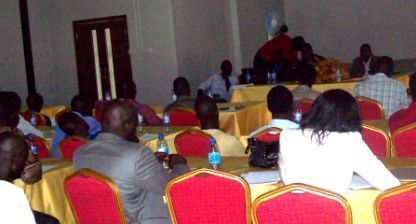Sudan’s Upper Nile youth on prevention of elections hostilities
By James Gatdet Dak
March 15, 2010 (JUBA) – As campaigns are underway for the general elections in Sudan, which polling day is just over three weeks away, youth from Upper Nile state have organized themselves to play the role of ambassadors of peace, preaching for peaceful campaign and voting in their counties in order to prevent any occurrence of violence during the elections and after the announcement of the results.

The youth from the four counties of Nasir, Maiwut, Ulang and Longechuk expressed their growing concern that the three election stages that include campaign, voting days and the subsequent outcome may cause violence under the current circumstances unless more efforts are exerted to dissuade the contesting politicians and voting citizens (supporters), particularly youths, from the use of violence so that elections are conducted peacefully, freely and fairly.
Despite the eagerness of southerners, most of whom will exercise their right to democratically choose their leaders for the first time, the youth however based their fear on the inexperience of most politicians and voting citizens in exercise of elections coupled with the number of political parties and contestants involved in each constituency and the idleness of youth in many parts of Southern Sudan.
In a statement he issued, the Event Coordinator, Gatwech Peter Kulang, who currently serves as the Director for South Sudan Development Agency (SSUDA), said eastern Jikany-Nuer section which inhabits the four counties in Upper Nile state, is not likely to be an exception when it comes to the possibility of election-related violence emerging in some parts of Southern Sudan.
“The coming elections are serving as a test for the entire population in Southern Sudan, the majority of whom have never participated in any meaningful elections in their lives…Given the number of candidates contesting for various positions, there is gloomy feeling that the campaigns are likely to polarize the communities and degenerate into a state of conflict leading to a flare up of violence during or after the elections,” he stated.
“Given the large number of idle youths in the area, it is possible that some irresponsible politicians may recruit them to carry out aggressive activities against their political opponents during electioneering or thereafter,” Gatwech added.
In the meeting aimed at creating more awareness to the youth about the elections in order for them to chart out an informed way forward, a number of presentations were made on the concept of electoral democracy, what Sudan’s electoral law says and possible root causes of election hostility or violence.
In the discussions a number of possible causes of election violence were identified. These included the fear of losing the polls by some contestants, instigation of voters by some contestants, propaganda dissemination aimed at causing rifts along [tribal] sectional lines and lack of proper information about the electoral process by section of voters.
Partiality in treating candidates and their supporters by security officials as well as officers of the National Election Commission; denying some candidates the opportunity to campaign freely through rallies; deleting names of some voters from the voters’ register; blocking or preventing some voters from casting their votes; use of offensive language or abuse by some contestants against others and blocking of agents of candidates or political parties from the polling centers are also among the identified possible causes of violence which the youth want to preach against.
Ms Nyathon James Hoth, member of the eastern Jikany-Nuer youth and daughter of the SPLA Chief of General Staff, Gen. James Hoth Mai, and Engineer Gonder Timothy Tongyik, in particular delivered their presentations on the role of the Youth in preventing election hostility and practical ways of mitigating election hostility at Community level.
The recommendations include, among others, intervention through community peace committee which membership would include community leaders (elders, youth and women), organizing dialogue for contestants where there is simmering hostility and which should also be attended by security officials as well as the representatives of the electoral body and in addition to appealing to the youths in the localities at ‘Youth Forum’ not to involve in violent activities.
The meeting was also entertained by a number of local artists from the state who sang about peace.
Eastern Jikany-Nuer clan of Upper Nile state shares common border with Ethiopia’s Gambella region which is also mostly inhabited by the same Nuer clan whose sections are separated by the international border. Bilpam, the historical Anya-nya II headquarters from 1975 to 1983 and SPLM/A GHQrs from 1983 to 1990, located on the Ethiopian side of the border, is also inhabited by the neighboring eastern Jikany-Nuer across the border.
The youth hinted they would also want to maintain the peaceful co-existence between the two neighboring same sections in order to consolidate peace and stability in the eastern part of Upper Nile state.
Gatwech said he and a number of youth representatives from the respective counties would soon travel to the state to play their role and consult with the other youth representatives from their neighboring counties in Upper Nile and Jonglei states about the initiative.
(ST)
